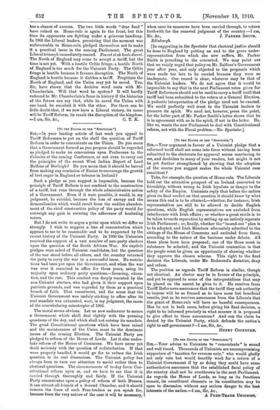[To THE EDITOR OP THE "SPECTATOR. "] SIE," -- Your argument in favour
of a Unionist pledge that a reformed tariff shall not come into force without having been submitted to the electorate for approval seems convincing to me, and doubtless to many of your readers, but might it not be yet further strengthened by showing that the adoption of the course you suggest makes the whole Unionist case consistent P
Take, for example, the question of Home-rule. The Liberals hold out the attractive prospect of an Ireland converted to friendship, without wrong to Irish loyalists or danger to the safety of the Empire. Unionists reply that before the nation gives its final verdict on that question it should know by what means this end is to be attained,—whether, for instance, Irish representatives are still to be allowed to decide English questions, while English representatives are excluded from interference with Irish affairs ; or whether a great stride is to be taken towards separation by setting up an entirely separate Irish Parliament ; or, finally, whether the " in-and-out " plan is to be adopted, and Irish Members alternately admitted to the sittings of the House of Commons and excluded from them, according to the nature of the business under debate. All these plans have been proposed; one of the three must in substance be selected ; and the Unionist contention is that the people must be given an opportunity of showing whether they approve the chosen scheme. This right to the final decision the Liberals, under Mr. Redmond's dictation, deny and refuse.
The position as regards Tariff Reform is similar, though not identical. An elector may be in favour of the principle, and yet be opposed to some of the interpretations that may be placed on the assent he gives to it. He receives from Tariff Reformers assurances that the tariff they ask authority to impose will be so framed aa to have none but beneficial results, just as he receives assurances from the Liberals that the grant of Home-rule will have no baneful consequences. Has he not in both cases, before giving his final decision, a right to be informed precisely in what manner it is proposed to give effect to these assurances ? And can the claim be denied by the Unionist Party, which defends the nation's right to self-government P—I am, Sir, &c.,
HENRY COCKSURN.


































































 Previous page
Previous page